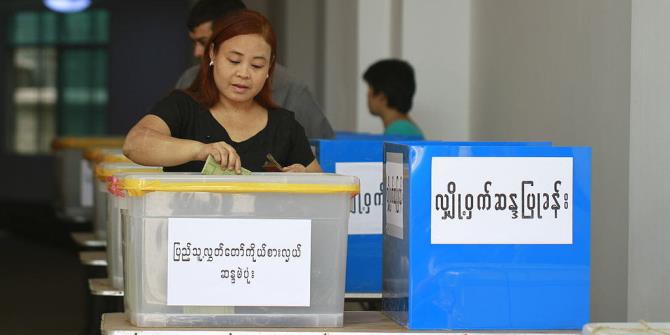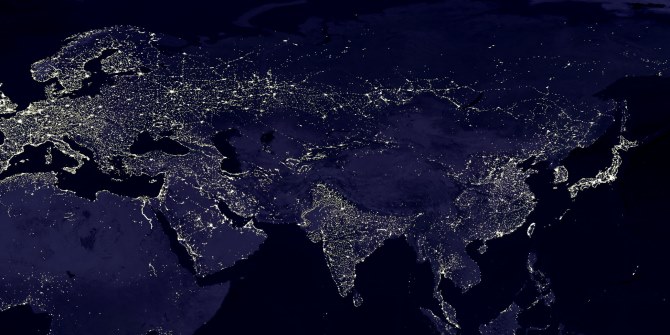 The LSE Saw Swee Hock South East Asia Centre recently held a public discussion to consider the upcoming election and its implications for Myanmar and the ASEAN region. On the panel were Myanmar experts Mark Canning, Dr Jurgen Haacke and Shibani Mahtani, and the session was chaired Danny Quah, Professor of Economics and International Development at LSE and Director of the LSE SEAC. Sonali Campion presents an overview of the discussion.
The LSE Saw Swee Hock South East Asia Centre recently held a public discussion to consider the upcoming election and its implications for Myanmar and the ASEAN region. On the panel were Myanmar experts Mark Canning, Dr Jurgen Haacke and Shibani Mahtani, and the session was chaired Danny Quah, Professor of Economics and International Development at LSE and Director of the LSE SEAC. Sonali Campion presents an overview of the discussion.
Myanmar’s general election on 8 November marks the first widely contested election since 1990. 93 parties will be contesting more than 11,000 constituencies, although 25% of seats will still be reserved for the military. Regardless of whether the incumbent Union Solidarity and Development Party (USDP) or Aung San Suu Kyi’s National League for Democracy (NLD) comes out on top, the result will have long-term implications for the country and its relations with the rest of the world.

On 5 October, the LSE Saw Swee Hock South East Asia Centre (SEAC) held a public discussion to consider the progress of political and economic reforms in Myanmar since 2010 and assess possible electoral outcomes. The panel featured Mark Canning, Senior Adviser at Bell Pottinger and former UK Ambassador; Jurgen Haacke, Associate Professor of International Relations at LSE; and Shibani Mahtani, an LSE alumna and Wall Street Journal Reporter based in Yangon.
Setting the scene
Mark Canning, UK ambassador to Myanmar in the early 2000s when it was still “one of the most closed and regressive nations” ruled by an oppressive military junta, commended Myanmar’s progress in recent years. He pointed to a new political openness since 2010 evidenced by the release of opposition leader Aung San Suu Kyi and other political prisoners, and competitive by-elections in 2012 . Liberalisation and the loosening of sanctions have helped to create jobs and strengthen the economy. The peace process has seen the beginnings of reconciliation between the government and ethnic minorities in the north. Despite the persistence of serious problems, such as the persecution of Rohingya Muslims, rising Buddhist nationalism and continuing economic weaknesses, Canning argued that that the overall direction of travel is positive, and the question is whether this election will keep Myanmar’s democratic development moving forwards.
The question that many in the international community are asking is, how will the NLD fare? Canning predicted that it will be the largest party, but that it may not win a majority. This is due to factors such as the number of seats reserved for the military, the growing strength of the Buddhist nationalists, and the likelihood that ethnic minorities will vote for ethnic parties. Furthermore, the military’s insistence on retaining a quarter of seats for themselves indicates a reluctance to cede power, so even with a majority, it is not clear how the government will operate in practice. Canning stressed that vested interests cannot be wished away although his gut feeling is that Myanmar will “muddle through, as it has done before”.
Myanmar’s foreign relations
Speaking second, Dr Jurgen Haacke emphasised that the elections will determine how Myanmar’s foreign relations develop, particularly with the US and China. America’s relationship with Myanmar has made significant progress under the Obama administration. The majority of the sanctions have been lifted and the US has invested heavily in democratisation. Myanmar’s government in turn has made a number of concessions that would have been unthinkable before 2011. But differences remain on core issues, for example, how to change civil-military relations. The US is also concerned about ethnic violence in the north and escalating Buddhist nationalism.
So how might the relationship with the US change as a result of the election? Haacke indicated the US is looking for free and fair elections. This might be possible up to a point, but concerns have already been expressed around voter registration and the disenfranchisement of Muslim voters. The role of Aung San Suu Kyi will also be of interest – the US will be hoping she will be able to take up some position of political authority, even if it is not the presidency. If the NLD form the government this is likely to guarantee further engagement. If they don’t, progress will be slower, but as America is now heavily invested, it is unlikely withdraw completely.
In contrast, Haacke said Myanmar’s relations with China are arguably at their lowest point since the end of the Cold War. This is in part due to unease among the ruling elite about dependence on China, and a wider anti-China feeling that stems from the perception that the PRC was instrumental in supporting the military government in the 1990s and 2000s. The ethnic conflict on the border has caused further tensions: many suspect China of supporting the Myanmar National Democratic Alliance Army in Kokang against government forces, a conflict which Haacke argued is linked to the failure by the government to secure a ceasefire among the ethnic armed organisations (the long-awaited ceasefire agreement, signed on 15 October, was weakened by the fact only eight of the 15 rebel armies agreed to participate).
According to Haacke, China will be closely following how its interests are affected in the wake of the election, namely:
- What will be the role of foreigners in the peace process?
- Will Myanmar resume the Myitsone Dam project? China has already invested heavily in the dam, but construction was suspended in 2011 as part of the democratic opening
- Will the new government cooperate on strategic projects, such as China’s ‘One Belt, One Road’ concept?
- Will Myanmar move closer to the US and the West?
Limits on democracy
Wall Street Journal reporter Shibani Mahtani began by reflecting on the unbridled optimism that was palpable on her first visit to Myanmar in 2012, especially after President Obama’s visit. To the Burmese, being embraced by the West was seen as a “huge vote of legitimacy”. That optimism has now turned to realism about how far the democratic transition has managed to progress and how far the nominally civilian government is willing to make concessions. Serious structural issues remain in the run up to the vote. Attempts to make the constitution more democratic have failed repeatedly: 25% of seats in parliament remain reserved for military generals and the restrictive rules on the presidency continue to bar Aung San Suu Kyi – the country’s most popular politician – from the top job (because she was married to a foreign national). Mihtani wondered how many people actually realise Daw Suu cannot become president, raising the possibility that this will cause disappointment or unrest after the election.
She also highlighted the serious attacks on minority rights that have escalated, unchecked, despite the reformist agenda. For example she referred to the plight of Rohingya Muslims whose rights are steadily being eroded. First they were attacked during violent riots in 2012, then they were pushed into camps. Today, they are fleeing in their thousands “much like Syrian migrants to Europe”. Now their right to vote is being taken away, although this has not been made clear to them, creating the potential for instability on election day. Linked to this is the rise of hard-line Buddhist nationalism which has led to a notable absence of Muslim candidates fielded by major parties, thus denying Burmese Muslims representatives to fight their corner. The NLD has been attacked by nationalists for failing to offer sufficient Buddhist protections and the party admits that the pressure is stopping them from fielding Muslim candidates. Mihtani suggested that Buddhist nationalists could be a dangerous force in the new government, as they have already successfully campaigned for legislation which permits discrimination, such as a population control bill which stops Buddhist women marrying non-Buddhists.
Mihtani then turned to shed further light on NLD weaknesses which are likely to impact its vote share. First, she drew attention to Daw Suu’s failure to build alliances with ethnic parties or to establish an agreement whereby the NLD would not contest certain seats in exchange for support in a coalition. Second, she pointed to Daw Suu’s “fading glory” among intellectuals and urban elites. Students in particular have become disillusioned because they agreed not to form a political party on the understanding that the NLD would offer them a platform, but Daw Suu has alienated this group by her failure to field key leaders of the movement as candidates. Mihtani suggested that Aung San Suu Kyi was reluctant to reach out because she is determined to see the NLD win a majority and may still be hoping she can change the constitution and become president.
Conclusion
The panelist presentations were followed by a lively audience question and answer session. This covered topics such as coalition formation, Aung San Suu Kyi’s decision to enter politics, the NLD as a one women show, the foreign investment opportunities in Myanmar, possible triggers for violent conflict and the capacity of education system (virtually destroyed under military rule) to produce the technocrats required to take Myanmar forward.
Despite the panelists’ illuminating presentations and responses, the event raised as many questions as it answered and painted a picture of great uncertainty. All three speakers emphasized that Myanmar’s unreformed constitutional rules on forming a parliament and selecting a president means it is likely that the post-election horse-trading will go on until March 2016, increasing the likelihood of a protracted period of instability. Therefore external observers must be realistic in their expectations of how far the forthcoming election will advance Myanmar’s democratic transition.
Click here to listen to the podcast of the LSE Saw Swee Hock South East Asic Centre event.
Note: This article gives the views of the author, and not the position of the South Asia @ LSE blog, nor of the London School of Economics. Please read our comments policy before posting.
About the Author
 Sonali Campion is Editor of the South Asia @ LSE blog. She recently completed an MSc in Comparative Politics at LSE and also works at Democratic Audit UK. She tweets @sonalijcampion.
Sonali Campion is Editor of the South Asia @ LSE blog. She recently completed an MSc in Comparative Politics at LSE and also works at Democratic Audit UK. She tweets @sonalijcampion.
Read more posts by Sonali here.







